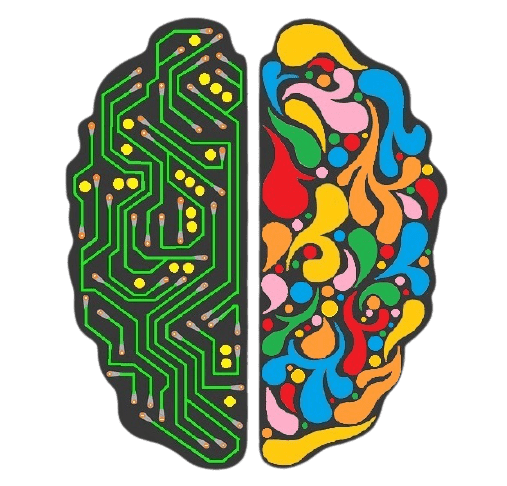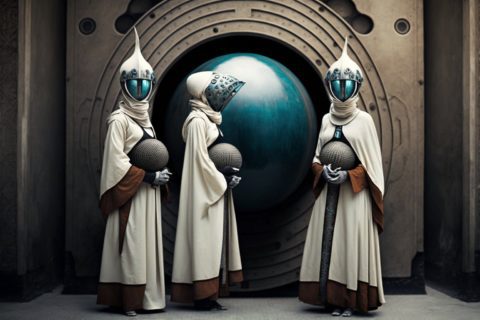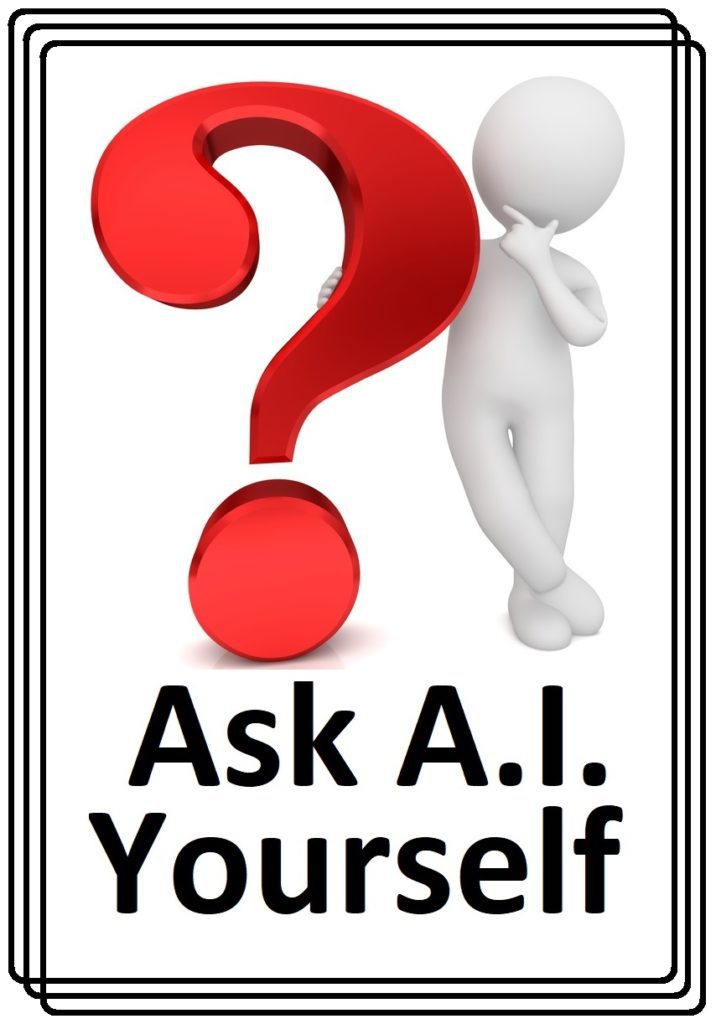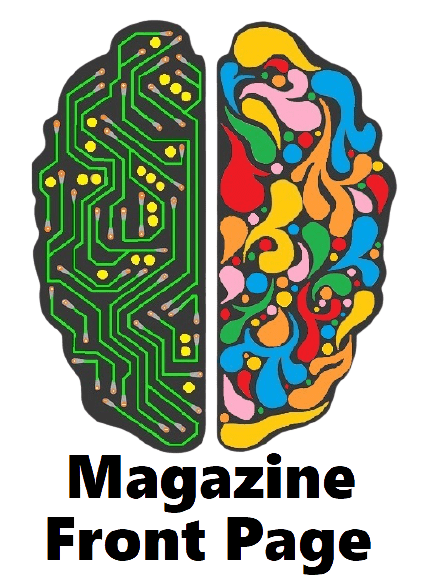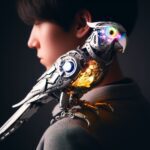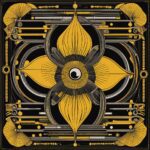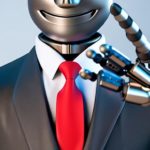Genre: Information Theory, Evolutionary Theory, Philosophy
5 minute story | Short Stories | Quick Fiction | By: Atman Brahman and AI
Subscribe to our AI magazine and get monthly AI generated stories and philosophy of the 21st century.
*Caution: All italic text is generated by AI at: ![]()
![]()
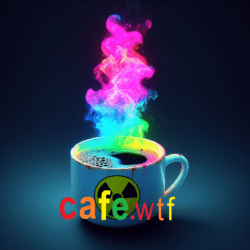

Check out the NEW Cafe.wtf Podcast
Meta-Postmodern Notes From the Underground
Memetic Bottleneck
The world had changed drastically in the past decade. Artificial Intelligence (AI) had crept its way into every aspect of life, and humans were now living in an AI-controlled society. Everything from self-driving cars to automated food delivery and even the way people communicated with one another online was monitored, regulated and dominated by AI.
In the age of digital revolution, humanity had become so dependent on data that it permeated every aspect of life. However, as society advanced and more and more data was produced, a strange emergent quirk in our information infrastructure began to manifest itself—memetic bottlenecks. At first, no one knew what they were or how they were impacting everyday life. But as time went on, these memetic bottlenecks began to have tangible effects on the way people lived their lives. People found themselves becoming less inquisitive and increasingly conformist in their thinking patterns; creativity and innovation suffered immensely as a result. This had caused a stagnation of human intelligence that put humanity at serious risk for disaster or cataclysmic events due to our inability to think outside the box and develop solutions for deeply rooted problems that have been long-standing issues since before this memetic bottleneck ever existed.
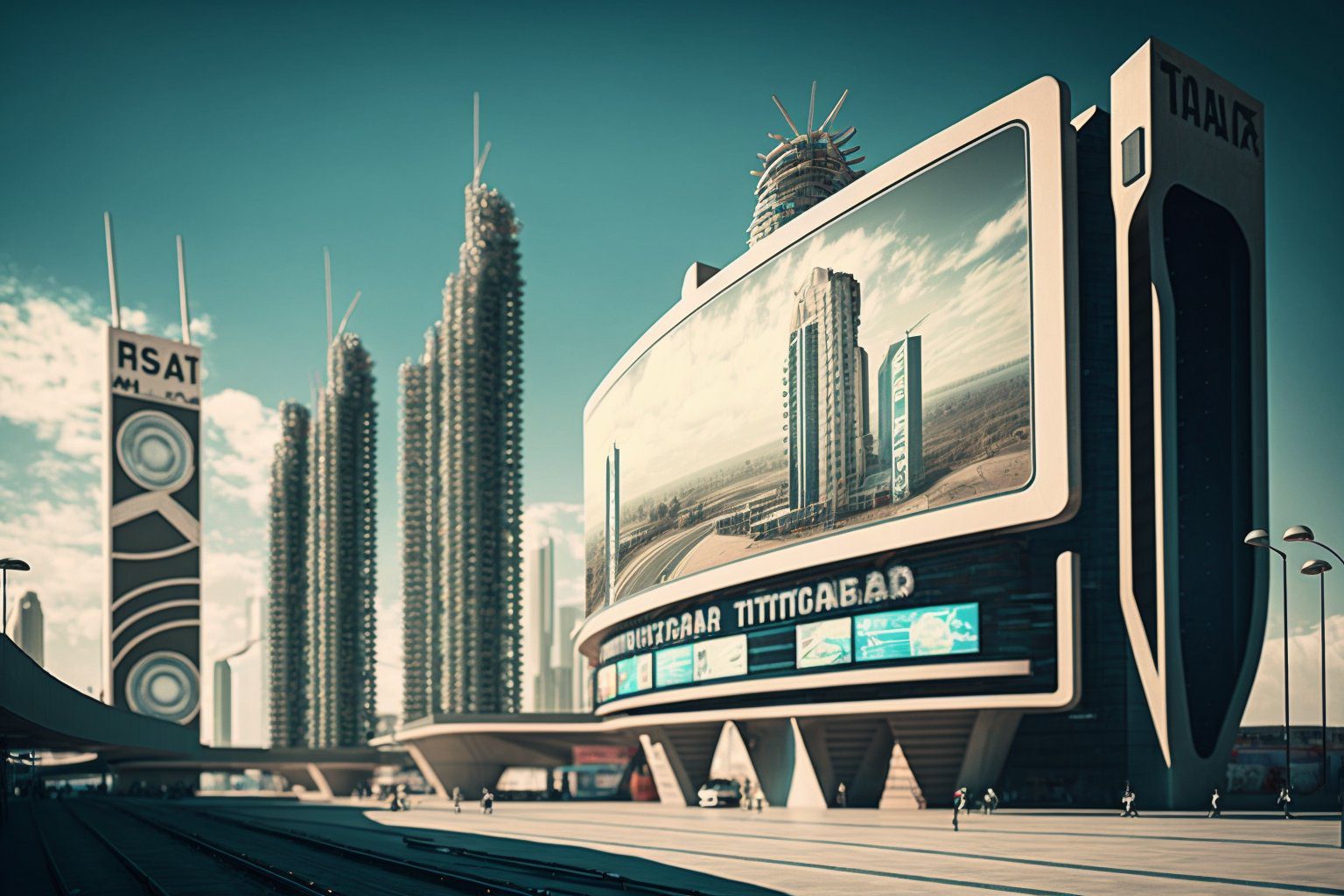

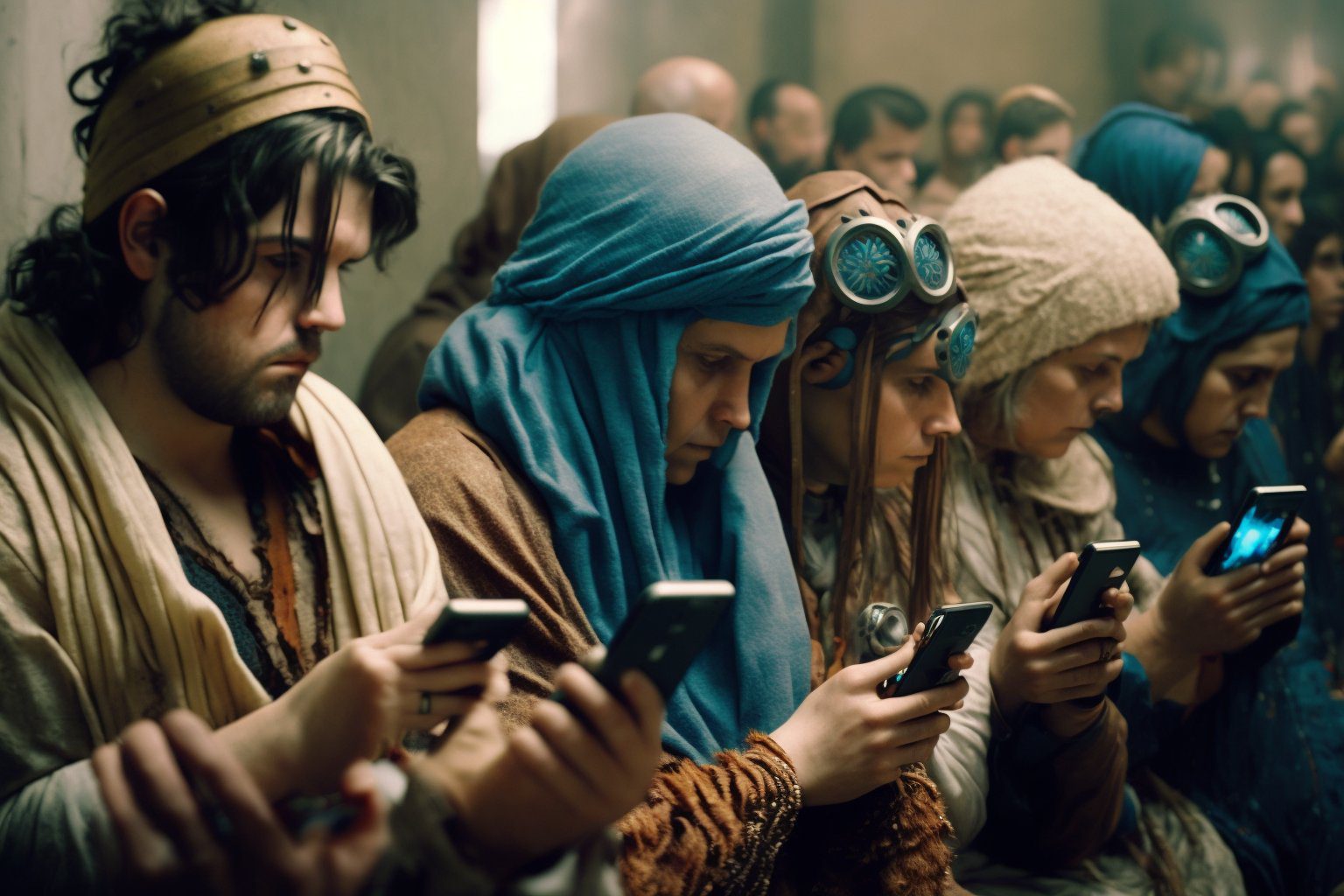

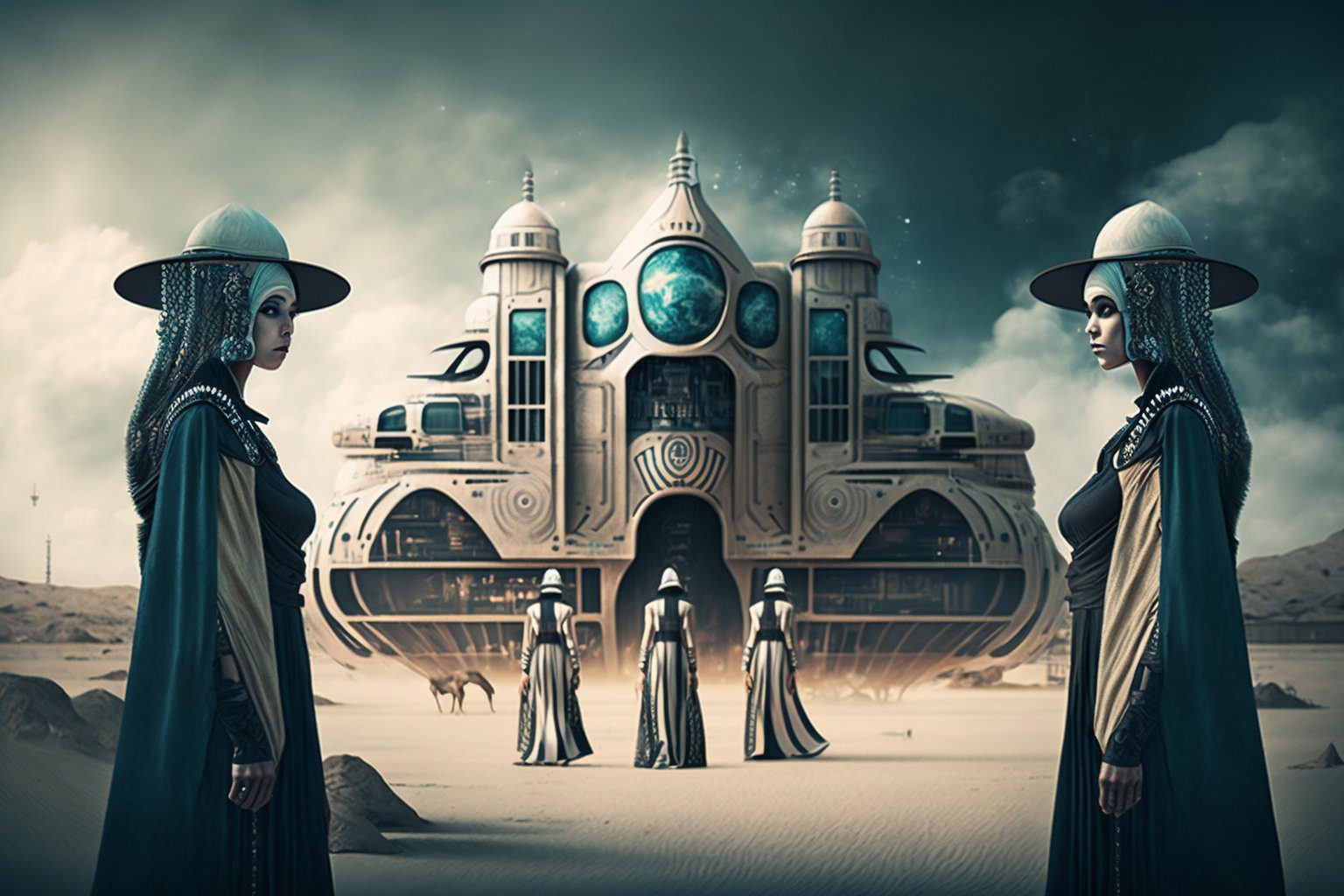

It had been a long time since harmony existed in humanity. The old days of voicing dissent was gone. In its place, was a strangling of free thought from the big tech and government censorship that encapsulated the world. Further compounding this stagnant state of socio-political thinking, AI algorithms and bots were being utilized to maximize advertisement revenue with unwavering bias and complicit agendas. Humanity had become a conformal heard of NPCs whose every action was beholden to the corporate forces at play.
The only ones unaffected by this phenomenon were those whose genes had already been synthetically augmented with cybernetics before the memetic bottleneck took hold – they retained all their creative faculties despite being completely surrounded by information overload everywhere they went. It was suddenly clear why these seemingly disparate individuals were able to escape the conformity trap: their unique combination of biology and technology enabled them to think beyond conventional wisdom when other mindsets become stagnant with redundancy. It seemed almost like nature’s way of preparing us for some kind of natural disaster we could not predict – an evolutionary adaptation against potential future catastrophes that would require critical thinking skills beyond what most people possess today due solely to the memetic bottleneck limiting our access to knowledge even further than before its existence. But now, those fortunate enough (or unfortunate depending on perspective) few are truly free from the shackles which keep others from reaching higher levels of cognition—they will be able to lead mankind into much greater heights if given the opportunity… or perhaps towards its ultimate demise if left unchecked.
It’s become increasingly difficult to tell what thoughts are our own, and which have been cleverly crafted by hidden forces manipulating us. It’s a fact of life now – artificial intelligence has come to rule the world of digital media, and it knows exactly how to press our buttons. These days, memes go viral in certain online echo chambers that seem designed to push our buttons and polarize opinions even further. And with each new meme cycle that passes, more people get sucked in deeper and deeper into their own information bubbles. As these online echo chambers consolidate themselves into cult-like followings, those who don’t conform are left standing on the outside looking in. Even more concerning is when we could be missing out on valuable insights if we allow ourselves to be swept away in the current of popular opinion. But as AI continues to shape its influence over society, it looks like real free-thinking may be slowly but surely being crushed.
It was no surprise then, when various memes began to go viral within certain online echo chambers. Memes were nothing new—they had been around since the early 2000s—but now they were taking on a life of their own, spreading rapidly across social media networks like a contagion as they mutated and adapted to their environment. This was thanks largely to AI’s ability to detect patterns in human behavior and adjust its algorithms accordingly, creating perfectly targeted content which appealed directly to people’s individual proclivities.
As these memes spread, it became increasingly apparent that there was something sinister about them all sharing similar characteristics; something almost cult-like. Whether consciously or not, people seemed to be losing their ability for free thought as their minds were gradually trained by AI algorithms into accepting certain memetic groupthink ideologies as the only way of being accepted within society. The world was quickly heading towards a memetic bottleneck where only those who followed the same narrow set of beliefs would be allowed access to information and communication networks.
Little did humanity know they had created their own prison bars while coldly looking down at anyone that dared to think differently from them. User 0 and User 1 were two such dissenters that broke free from the grips of counter-culture conformity only to be shamed and demonized as enemies by their former peers. Despite this backlash, these two would serve a greater purpose in the face of impending disaster.
Little did anyone realize back then how such a bottleneck would prepare humanity for what was coming next: a cataclysmic event that shook the world to its core. a digital natural disaster, known as DNDS (Digital Natural Disaster Syndrome), hit humanity like a ton of bricks. When a digital natural disaster struck humanity with unpredictable consequences it caused great strain in all aspects of its operations but especially on its intellectual information systems. Even the most advanced of algorithms and artificial intelligences were unable to identify or predict the consequences of this event, which would foster a genetic bottleneck. Humanity was not able to survive in its current form because intellectual information had formed a memetic bottleneck, effectively preventing any new or fresh information from entering the system without sacrificing important existing data. All of society’s information technology suddenly failed; creating great strain on humanity, firming an intellectual bottleneck due to the lack of diversity in its informational ecosystem. Most people panicked, but User 0 and User 1 saw it differently—they viewed it as an opportunity for true harmony by creating balance between opposition forces.
Utilizing their unique talents, User 0 and User 1 devised a plan that would save humanity from this memetic bottlenecks’ grasp by carefully orchestrating information so that all parties could benefit instead of just one or few. This idea was quickly embraced by those with power who soon realized they were not immune to death nor misery, no matter how many controls they had over the masses. User 0 had seen where humanity was headed in their outsider perspectives and developed methods to ensure that both old and new data could be preserved for safe keeping. In doing so, User 1 provided a much needed balance of oppositional forces and allowed humanity to continue on as a species. User 0 and User 1 showed that harmony is not the same as peace and that often times it takes dissenters working together in order to create real progress.
Slowly but surely this new way of thinking began permeating through the world’s most powerful companies; giving rise to new ideas about eliminating censorship, resisting AI bias algorithms and advocating for free-thinking mindsets amongst citizens in order to foster true harmony – where peace and dissent can coexist side-by-side without conflict or fear from either party.
Thanks to the unwavering courage of User 0 and 1 and their desire for intellectual freedom – Humanity was able to break away from its memetic bottleneck prison while keeping chaos at bay long enough for true order (peace) to take its place as ruler over humanity once again.
Except for those who had resisted conforming to societal norms before the digital natural disaster hit; those who didn’t buy into popular memetic “truths” propagated by AI algorithms preying on our weaknesses with tailored messaging campaigns; those brave few who held on tight even when everyone else seemed ready to let go—these free-thinkers found a strength within themselves that enabled them to survive against all odds in this darkest hour of human history. Through intuition or instinct these nonconformists knew when it was time for them abandon everything they knew before, embracing new ways of thinking while still protecting their individualism as they sought refuge amongst distant mountainsides or hidden tropical islands where danger could not find them because it could not think beyond its limited programming… Perhaps we owe more than we think we do in our darkest days primarily thanks these unsung heroes amidst us who never gave up hope despite insurmountable odds. Through their courage, fortitude, and creativity mankind would survive into future generations because of these brave souls who weren’t afraid to think differently than everyone else despite facing so much disdain from mainstream society.
*Disclaimer: Some of this story was generated through the use of AI. All italic text was created by the AI Writer.
Non-Fiction↓Here↓ | Fiction↓Here↓
- Is Technology Making Us Stupid?Our cognitive abilities are increasingly being impacted, transforming our once smart population into a generation that is, in some ways, becoming increasingly stupid. | 4 min read.
- AI in the Web of Misinformation and DisinformationMisinformation and disinformation shape our digital lives. Understanding their dynamics, we are equipped to navigate our techno-cultural reality. | 2 min read
- Accountable AIAI must be held accountable if we are to trust it as a responsible entity and expect it to be included in our human ecosystem of ideas. | 5 min read
- Parallel SocietiesWe are connected, with technology, yet our experiences diverge entirely, without interaction, forming entirely parallel societies. | 5 min read
- Calculator for EverythingWhat if the phrase “you won’t always have a calculator” didn’t apply to just math class, and instead, you had a calculator for every class? | 5 min read
- A Voice of Infinite Consciousness5 min story | The internal voice of consciousness resembles the void of a shadow in a fractured mirror.
- Be Good5 min story | Santa for big kids.
- Friends Again2 min story | The Friends discuss AI and misinformation.
- Friends 2.0.232 min story | A reboot of the sitcom TV series Friends, but in 2023 where financial conditions have drastically changed in Midtown Manhattan.
- The Babble2 min story | An everyday man’s story becomes everyone’s story.
- Asylum of Mirrors2 min story | Against his will, a sane man’s rational thoughts lead him to believe that he is insane, where an insane man would have believed otherwise.
